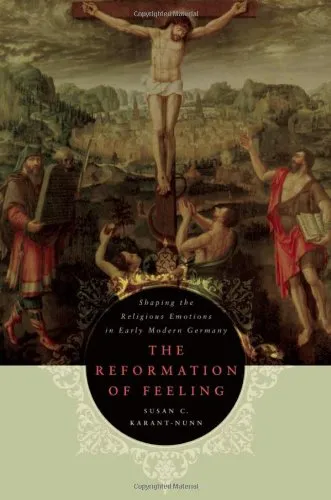The Reformation of Feeling: Shaping the Religious Emotions in Early Modern Germany
4.5
Reviews from our users

You Can Ask your questions from this book's AI after Login
Each download or ask from book AI costs 2 points. To earn more free points, please visit the Points Guide Page and complete some valuable actions.Introduction
The Reformation of Feeling: Shaping the Religious Emotions in Early Modern Germany is a groundbreaking exploration into the emotional dimensions of religious transformation during the Reformation period in Germany. Authored by Susan C. Karant-Nunn, this book delves into the ways religious leaders sought to influence and transform the emotional lives of their communities, shaping collective and individual feelings in alignment with their theological objectives. By combining meticulous historical research with cultural analysis, this work sheds light on how emotions such as fear, joy, sorrow, and love were intentionally cultivated to create profound religious experiences and deepen devotion.
The book transcends traditional theological analyses and offers readers a compelling, human-centered narrative of the Reformation's impact. Through sermons, hymns, liturgies, and visual arts, Karant-Nunn unpacks the strategies employed by pastors and other leaders to mold emotions and redirect spiritual experiences. By focusing on the emotional landscape of German communities during a pivotal era, the book challenges us to rethink the intersection of religion, power, and human psychology. Whether you're a scholar of religious history or an enthusiast of cultural studies, this book offers a rich and thought-provoking reading experience.
Detailed Summary of the Book
The Reformation of Feeling is deeply rooted in archival evidence, examining sermons, correspondence, hymnals, and disciplinary records to unravel the ways in which leaders of the Reformation sought to influence believers' emotional lives. The book emphasizes the intentional efforts of religious authorities—primarily Lutheran clergy—who used both positive and negative emotional triggers as tools for shaping religious practices. Karant-Nunn argues that emotions were not merely personal responses but were systematically cultivated to support ideological frameworks.
Divided into thematic sections, the book explores key emotional constructs such as fear of divine punishment and joy in salvation. It examines how these feelings were instrumental in conveying core doctrinal tenets and reinforcing the new Protestant identity. For instance, sermons often juxtaposed dire warnings about hell with promises of redemption, thereby emotionally engaging parishioners while driving home theological doctrine. Furthermore, Karant-Nunn analyzes the role of lamentation rituals, confessions, and acts of spiritual discipline, demonstrating how sorrow for sin was harnessed to promote moral reform.
Another notable aspect is the book's focus on aesthetic mediums, including music and visual art, as powerful vehicles that elicited emotional responses aligning with religious intent. Hymnals, choir compositions, and altar paintings—imbued with propagandist undertones—helped create immersive emotional experiences. By the end of the work, the reader gains a nuanced understanding of how emotional manipulation played a central role in cementing the successes of the Reformation.
Key Takeaways
- Emotions were a vital tool for religious leaders during the Reformation, used to shape beliefs and practices.
- Fear and joy were central emotional constructs intentionally cultivated via sermons, hymns, and rituals.
- Emotional experiences were intentionally tied to aesthetic representations, such as music and religious art.
- The Reformation was not just an intellectual movement but also an emotional revolution in spiritual lives.
- The book provides a fresh lens on understanding religion as a deeply human and emotional phenomenon rather than solely doctrinal.
Famous Quotes from the Book
"The Reformation compelled people not only to rethink their beliefs but to reshape the very feelings that mediated their faith."
"Through fear, joy, and sorrow, religious leaders created a new emotional framework for divine experience—one that resonated deeply with their cultural moment."
"Religion, at its core, operates not merely on the mind but on the heart—a truth the Reformation both rediscovered and exploited."
Why This Book Matters
The Reformation of Feeling invites readers to reconsider the transformative power of emotions within historical contexts. While much of religious history focuses on ideological or doctrinal shifts, Karant-Nunn emphasizes the equally crucial role of emotional cultivation. Her innovative approach positions emotions not as secondary considerations but as central to understanding the Reformation’s enduring impact.
The book bridges gaps between religious studies, history, and psychology, offering valuable insights to scholars and general readers alike. It matters because it challenges dominant narratives that portray the Reformation in purely theological or political terms, restoring the humanity and emotional complexity of those who lived through it. For anyone interested in uncovering the emotional threads of history, this book is indispensable.
Free Direct Download
You Can Download this book after Login
Accessing books through legal platforms and public libraries not only supports the rights of authors and publishers but also contributes to the sustainability of reading culture. Before downloading, please take a moment to consider these options.
Find this book on other platforms:
WorldCat helps you find books in libraries worldwide.
See ratings, reviews, and discussions on Goodreads.
Find and buy rare or used books on AbeBooks.
1075
بازدید4.5
امتیاز50
نظر98%
رضایتReviews:
4.5
Based on 0 users review
"کیفیت چاپ عالی بود، خیلی راضیام"


